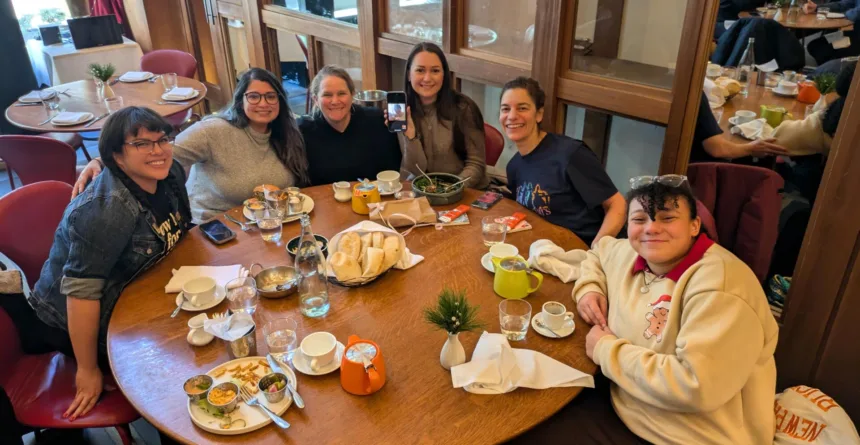Honoring Your Needs: YOU ARE NOT TOO MUCH
July 21, 2021

My partner gave me the best compliment during our closing session of couples counseling: “You’ve really grown in asking me to do things.” From the outsider perspective, this may seem like a strange complement. What the outsider doesn’t see is the hours of therapeutic conversations, both together and separate, that helped us identify, accept, and express our individual needs.
Expressing wants and needs is a common barrier I see on the other side of the therapy room when I’m sitting with my clients. Clients feel stuck in their relationships (romantic, platonic, professional, familial) because they run into the bind I was once locked in: I want X (more time together, to be invited to the party, to take a vacation, to be less responsible for my siblings) and at the same time, my want and need for these requests are shameful, scary, and “too much”. This bind can lead us to the common negative narrative about ourselves (I am a burden), as well as the negative narrative towards others (they don’t care).
So how can therapy help us work through this bind so that we can all grow in asking for what we want? Let’s take a look at three core processes therapy can help us with.
Identifying and Honoring Your Wants and Needs
As human beings, we all have wants and needs. MANY of them. Let’s pause to list a few common ones we work with in the therapy room:
Emotional needs:
- Connection/intimacy
- Privacy and time alone
Physical needs:
- Sleep/rest
- Sex and safe physical touch
Cognitive Needs:
- Creativity
- Play
Spiritual and communal needs:
- Interdependence
- Rituals
As we can see from this very brief list, wants and needs are not inherently problematic or “bad”. Most of these wants and needs are the zest of life. Yet, somehow most of us are taught they are wrong. Therapy helps us explore all of the various sources of stigmatization that color these human necessities.
Common roots of stigma we wrestle with in the therapy room:
- Societal and cultural stigmas
- “women should not be needy”
- “you’re not allowed to have needs in our family”
- Invalidation of needs
- Sociopolitical invalidation: lack of healthcare, accessibility issues, inaction to provide safety
- Workplace invalidation: competitive work culture – not allowed to take breaks or time off
- Interpersonal invalidation: others being unwilling or incapable of meeting needs – lack of trust
Identifying that wants and needs are inherently human and the external sources of our internalized stigmas can help reduce shame to our wants and needs. With less shame, we are able to make more confident and compassionate moves in working with these barriers.
Rewrite the Narrative of Your Wanting and Needing Parts
So far we know wants and needs are good, but we often judge ourselves for having them. We can work to lessen this shame by identifying the roots and normalizing the conversation, but a further step therapy helps with is recreating the common “burden” narrative.
Many of my clients (and I) struggle with the “I am a burden/inconvenience/ too much” narrative. A narrative so deeply painful that we turn away from the people who love us – but not to any fault of our own. I work with clients (as my own therapist as helped me) to see how our systems were taught to protect ourselves by retreating. Perhaps our family system could not meet our needs, a significant harmful partner shamed us for our needs, or we’ve grown so accustomed to shaming ourselves because of the inner stigma narratives we have.
Therapy, especially therapy that is trauma-informed and attachment based, allows us to heal these younger parts of ourselves that were first hurt or taught they were burdens.
Some common ways therapy can help:
- EMDR work can process specific traumatic memories and desensitize the negative narrative in favor of a positive one.
- Parts work/Gestalt therapy to have our adult selves hear and attend to our younger selves to provide comfort that was needed.
- Somatic techniques to grow awareness in how our physical bodies react when our needs are not met, and use these feelings to express the want that was unmet.
- Couples therapy to help build communication about our needs and learn more about our needs as a couple and individually.
Therapy can find the roots of our pain, heal them over time and with continued brave and vulnerable work, so that we can advocate for our wants and needs from a fulhearted, confident place.
Expressing Your Wants and Needs
The key to more connecting and fulfilling communication and relationships can be summarized well by the Spice Girls: “tell me what you want, what you really, really want.”
Therapy not only helps with the identification of our core wants and needs, the healing of our past hurts and negative narratives, but it also provides us concrete tools to express the wants and needs that are close to our hearts.
The next time you are wrestling with a need or want, try these helpful tools:
- Identify the need that is not being met by listening to your feelings
- Loneliness can mean that we desire closeness and connection
- Anger or frustration can mean we need to change a situation or relationship
- Therapy can also help build strength in listening to our emotions to help identify our needs
- Affirm your needs:
- “My needs are not wrong or bad. I am allowed to have them.”
- Be curious of which stigmas or negative narratives may be trying to tell you otherwise – This is a great starting point, and often a common catalyst to beginning therapy
- Practice expressing them to a safe person
- Identify the supportive people in your life
- Perhaps your need for closeness can’t always be met by your parents, but your best friend is reliable and can meet your need for closeness if you send a text to grab dinner
- Therapy can help heal our individual stories, but our relationships with one another help us bring the safety of the therapy room into our every day experience.
My hope for all of my clients and any one who take the brave step to wrestle with their wants and needs is to feel the power of hearing “you are never too much” and wholeheartedly believing it. If you need support honor your needs, contact us at Steady NYC.



